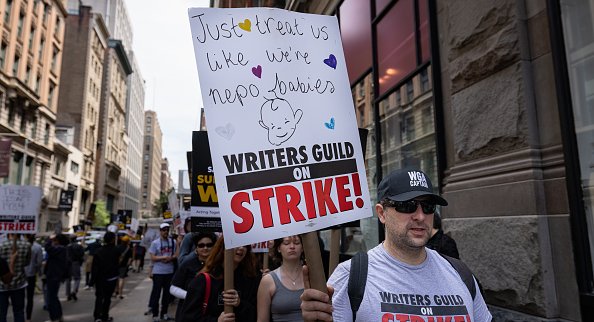Word broke late Sunday night that the Writer’s Guild of America had reached a tentative agreement with the trade group that represents the big Hollywood studios and streamers, marking the beginning of the end to a strike that has lasted 21 weeks and saw production come to a standstill across much of the TV and film industries.
It’s not the end of the work stoppage. The terms have to be finalized and voted on by WGA membership, and the Screen Actors Guild is still in the middle of its own strike, which began on Bastille Day, July 14.
But New Yorkers in the industry who have been out of work for five long months are starting to see the light at the end of the tunnel.
Lucia Santos, a continuity set costumer, said the strikes hit her on two levels: Her set work disappeared, and her burgeoning business – creating “modesty garments” for sex scenes and other intimate on-screen moments – came to a complete standstill.
“I’m one of the lucky ones,” Santos said. “I work on ‘Only Murders In The Building,’ and we ended shooting, like, three days before the strike started. So I was able to work and save money up until the very end.”
She needed it. Because her side gig is technically her own small business, Santos said she couldn’t file for unemployment. She’s burned through $30,000 in savings so far, and with all the deals yet to be resolved, she doesn’t expect her regular set work to pick back up until January.
Film and TV workers are used to bouncing from job to job, earning a check for as long as the project lasts. Santos said she usually keeps a buffer of one to two months of rent money to see her between gigs. But aside from the pandemic disruption, she said she’s never been out of work for this long.
“I feel lucky that I do have savings, but this is not exactly what I wanted to spend them on.”
Costume designer Christine Bean wrapped 10 seasons on NBC’s crime drama “The Blacklist” this summer. She said that as word began to spread last week that a deal was close, whispers of possible work did as well.
“You can’t really have any serious conversations until things are official,” Bean said. “But there are projects that people are kind of off-the-record starting to talk about. Hopefully when the SAG deal is done, those can become on-the-record conversations.”
An outstanding question is what the industry will look like coming out of the strikes. The streaming boom of the past decade has begun to dry up as the pandemic recedes, and work was getting tighter as the strikes began.
Meanwhile SAG-AFTRA, which had taken the day off for Yom Kippur, will resume its normal five-day-a-week picket schedule Tuesday.
New York Public Radio has a contract with SAG-AFTRA, but our staff belongs to a different branch than the actors and is not involved in either strike.




